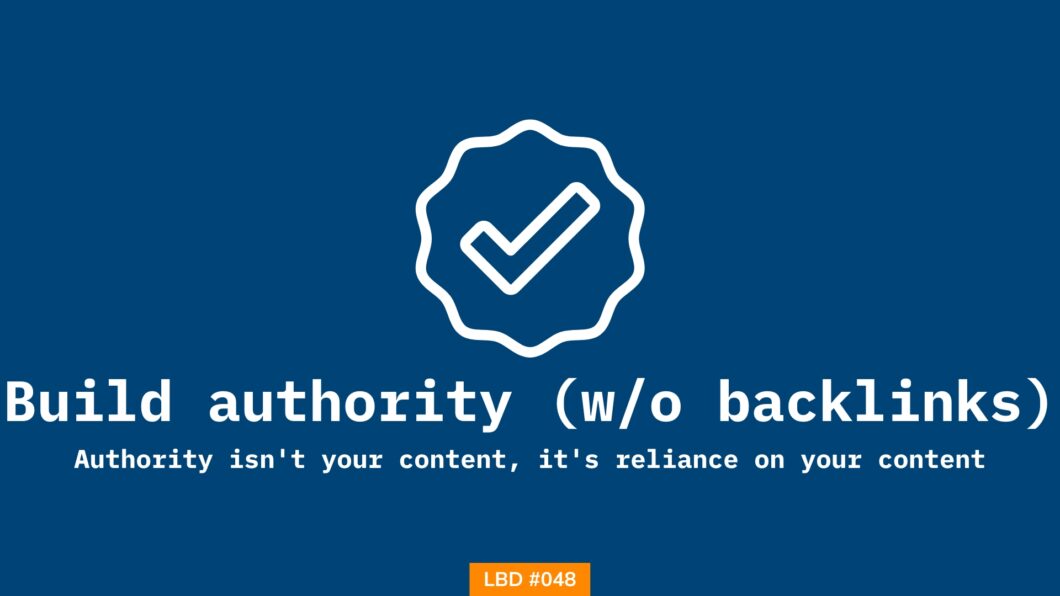Reading time: 04 minutes
You want to rank on search engines but there’s a problem – Lack of Authority.
“You don’t have to be seen as authoritative to rank on Google.” I’m not saying it, Google’s Search Advocate, John Mueller said it.
91% of the site on the web do not get any traffic from searches. NINETY-ONE PERCENT.
Is authority everything to rank? How to build authority to rank #1 on Google?
If these questions sound familiar, this issue is for you.
By the end of this issue, you will be able to:
- Understand what authority means
- Understand under what scenarios, you don’t need authority to rank #1
- Learn how to build authority in 3 actionable ways
It’s not the lack of authority that keeps you from ranking on Google. It’s a lack of understanding, of when & how authority is not a ranking factor.
You spend weeks & months crafting a strategy that is supposed to help your content rank #1 on Google. But crickets!
One thing that even a decent authority helps you with is rankings that are not frustrating. And:
- You don’t miss out on opportunities
- Attract quality backlinks naturally
- Non-linear traffic growth
- Exposure in front of the target audience
But first, let’s understand what site authority or Domain Authority means.
You’d think that publishing more content around a specific topic would make you authoritative. Sure, that makes sense, but algorithms have a different take.
Google’s Search Advocate, John Mueller was asked in one of the office hours about domain authority. You can watch the chat here. The whole point of the conversation was building authority for a one-page site. You probably won’t have a one-page site, but there’s interesting learning here.
“Creating content doesn’t automatically make your site authoritative,” John said.
The authority of a site isn’t built by the content, but it’s built based on the reliance of users.
Wikipedia has a DA of 93, is it because of the content? Definitely not. You’d choose a Wikipedia page over any other site for certain topics.
If that’s not authority, I don’t what is.
If this is clear to you, let me share 3 simple ways to boost the authority of your site:
Step 1: Build topical authority
Remember I said, content doesn’t make a site authoritative, reliance on the content does. Guess what’s the key factor to building that reliance? Yes! Topical authority.
Think of it this way, would people visit directly on your site & search for topics? If your answer is no, you need to pull up your sleeves and start working.
Here’s an easy way to start creating topically authoritative content:
- Research for search topics, not keywords. Keywords are misleading
- List all the topics searchers are looking for & create clusters. This is your outline
- Back your claims with data & expert opinions. Interview people if required (authority anyone?)
- Make your content readable. You don’t want your readers to jump off your page, because the readability is poor
- Build links but not for the sake of it. Build relevant links that actually complement the incoming searcher’s intent
- Internally link relevant pages. Use target keywords as link text
Step 2: Create a dense network of interlinks
Internal links are a superpower. This is your own way to control traffic on your site. Can’t for topic X? Find & create a page targeting topic Y and internally link both pages. Goes without saying that the pages must be topically relevant. Also make sure, Topic Y has a decently low search volume & easy ranking difficulty.
Once you control internal traffic, look for some sites where you can write guest posts. Say nothing, ask them if you can include a link. Heck, write on Medium and promote your blogs for free. Don’t overwhelm your readers with a ton of links.
If you can’t explain it right in the post, leave a link for further reading. Simple.
Step 3: Build social proof
Social proof speaks a lot these days. Get on Linkedin, pick 3-5 topics you want to be known for & start creating content. Don’t force yourself to create something that you’re not comfortable with, at least not in the beginning. Do the same on Twitter.
Create free resources, ask for testimonials & showcase it on your website. Use schema markup for those reviews and add it to your website. These reviews will be shown on SERPs for specific pages, adding to your social proof.
Today’s action steps → Get keywords report from Google Search Console to find interlinking opportunities. Here’s how
Creator Spotlight
I got in touch with Zuzanna Krüger to talk about authority & she shared amazing insights from her experience with Domain Authority. Zuzanna shared a Reddit thread where John Mueller states that DA is not a ranking factor. For the context of this post, Here are some nuggets on DA for founders, especially first-timers.

P.S. Don’t forget to check out her book – The Art of SXO on Amazon
SEO this week
- Here’s why should use ChatGPT for legal websites – SEJ
- Like Semantic keywords, does Semantic HTML has any impact on Google? – SEJ
- Performance Max was a breakthrough for Google Ads. There’s an AI angle to Google Ads now. Thanks to Google
- Generate schema markup with few clicks with this tool
- Google has changed how FAQs & How To schemas will be shown on SERPs. You may not like the change
- Something I’ve been bullish about since the AI wave started. You’ll love it
- Does linking out to an authoritative website help with SEO? John Mueller answers
- Getting started in your SEO career? You need to read this right now
- Topical authority is becoming the talk of the SEO town. Know your way
- From Twitter to becoming X, how brand equity has flown? – Dr Peter Meyers
Masters of SEO
- Louis Smith shares how micro-conversions are SEO hack. What conversions translates to? – Authority
- SEO is fruitful but slow. How to navigate through? Patryk Wawok has interesting take
- Overwhelmed by SEO tasks? Use these 4 frameworks to ease your nerves
- Behold! You’ll be blown away by this. – Zuzanna Krüger
- What does optimizing 200,000 pages teach you? Samy Thuillier shares
How can I help you?
I put a lot of effort to come up with a single edition of this newsletter. I want to help you in every possible way. But I can do only so much by myself. I want you to tell me what you need help with. You can get in touch with me on LinkedIn, Twitter & Email to share your thoughts & questions that you want to be addressed. I’d be more than happy to help.
Whenever you’re ready to dominate SERPs, here’s how I can help:
- Sit with you 1-on-1 & create a content marketing strategy for your startup. Hire me for consulting
- Write blogs, social posts, and emails for you. Get in touch here with queries (Please mention you found this email in the newsletter to get noticed quickly)
- Join my tribe on Twitter & LinkedIn where I share SEO tips (every single day) & teaser of the next issue of Letters ByDavey

